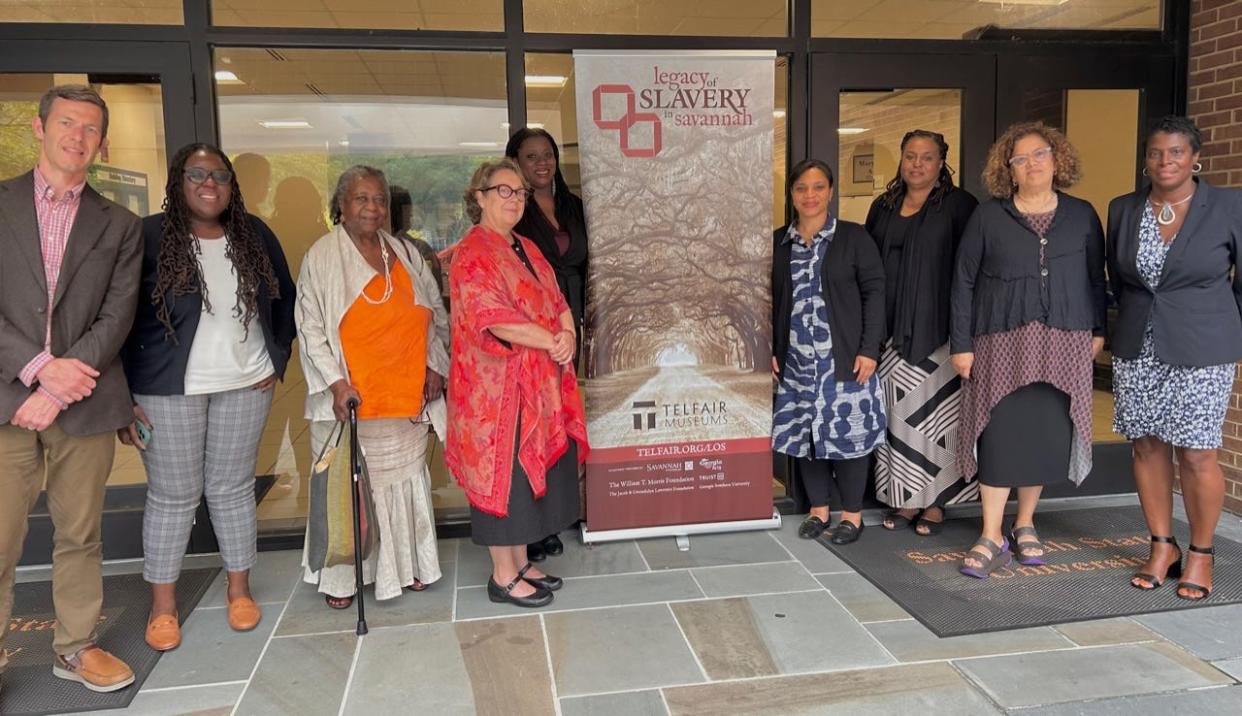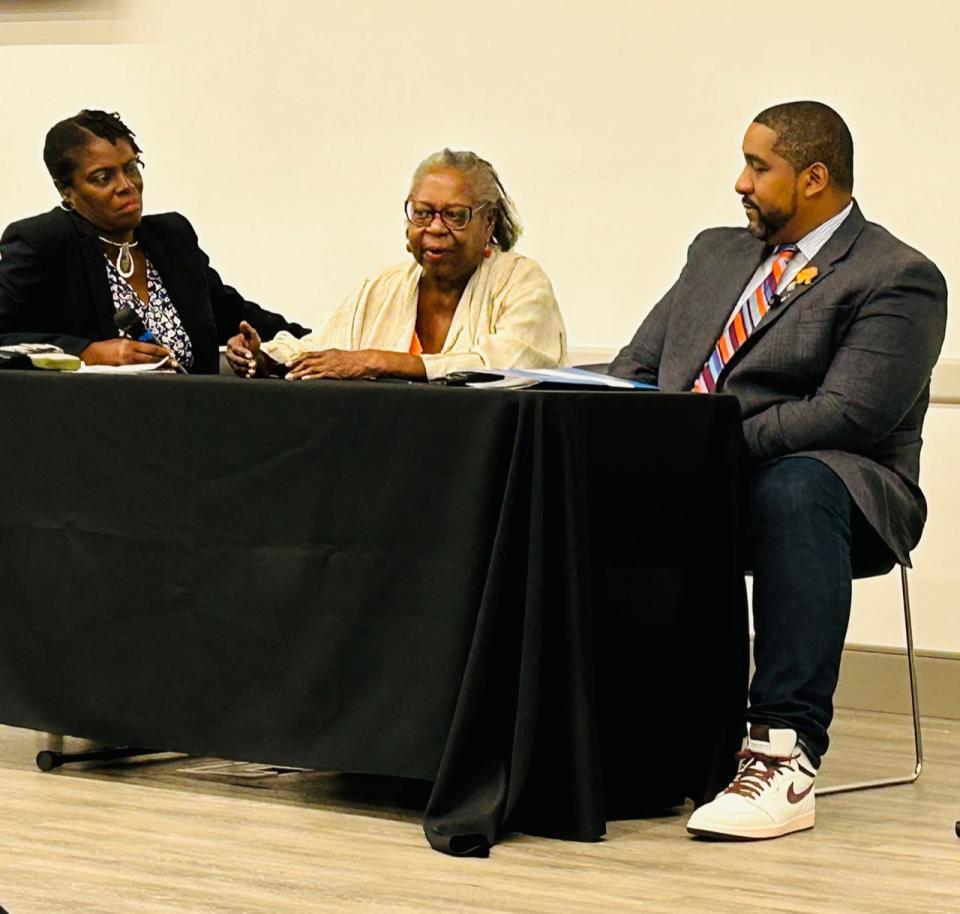Savannah State University and Telfair Museums' symposium discusses community's legacy of slavery

Friday, Oct. 13, Savannah State University (SSU) hosted Telfair Museums’ Community in Conversation: Legacy of Slavery in Savannah. Telfair began the initiative in 2019 to “work with the community to consider how the legacies of slavery still manifest in our city.”
Dean of College of Liberal Arts and Social Sciences (CLASS) David Marshall talked of SSU’s “mission of developing productive members of a global society through high-quality education, scholarship, research, service and community involvement.” He then introduced Melissa Cooper, Ph.D., associate professor of history at Rutgers University-Newark and co-editor of the “Legacy of Slavery in Savannah” volume. She shared that she agreed to work alongside co-editor Talitha LeFlouria, Ph.D., associate professor of history and fellow of the Mastin Gentry White Professorship in Southern History at University of Texas Austin, because Cooper was “swayed by the opportunity to disrupt the charm that conceals the untold stories of this city’s and the region's past.”
Sapelo Island: Descendants of enslaved people vow to fight after Georgia county approves larger homes for enclave
The Weeping Time: Charleston enslaved auction finding adds to the larger American story

Panels of national liberal arts scholars speak at Savannah State
Distinguished professors of English, History, and Africana or African American Studies presented their work based on various aspects of Savannah’s Black history.
Jelani Favors, the Henry E. Frye Distinguished Professor of History at North Carolina A&T State University, led the first grouping, which touched upon Education, Memory, and the Legacy of Slavery. Favors shared how Black people in America carved out spaces for themselves to be educated ― Historically Black Colleges and Universities (HBCUs) such as Savannah State being one major example. His book hinges on the idea that there is a second curriculum that existed beyond the science, math, and rhetoric taught at HBCUs. He described the second curriculum as entailing race consciousness, idealism and cultural naturalism.
Fath Davis Ruffins, curator of African American history and culture at the Smithsonian National Museum of American History, then presented on the complicated history of Black representation in art, literature and cinema through what she called a mythopoetic lens. She challenged a once popular notion that Black Americans were a people without a history. She talked about how African Americans created physical museums independent of African American colleges in the late-1800s. Then Anne C. Bailey, professor of history and Africana studies and director of the Harriet Tubman Center for Freedom and Equity at SUNY Binghamton University, explained her archival research on the Weeping Time, one of the largest recorded auctions of African American slaves in United States history. The 1859 auction of 436 men, women and children, including 30 babies, took place in Savannah and amassed plantation owner Pierce Butler $303,850. Bailey also discussed how she tracked down descendants of 15% of the enslaved people listed on the auction ledger.
Assistant Professor of History & Comparative Studies at the University of Louisville Felicia Jamison and Professor of History and African American Studies at the University of Virginia Andrew Kahrl comprised the next panel on land ownership in the Lowcountry. Jamison, a descendant of former enslaved people who were given land in Liberty County, detailed how much of that land was taken back from Black people through the use of eminent domain by the U.S. government for the construction of Fort Stewart. Kahrl’s talk featured much of his work on his forthcoming book “The Black Tax.” His research situates Sapelo Island in a historical context that, “uncovers the structural and administrative features of local tax systems in America that structurally disadvantaged African American landowners.”
Julie Buckner Armstrong, a professor of English at the University of South Florida; Mia Bay, the Roy F. and Jeannette P. Nichols Professor of American History at the University of Pennsylvania; and Michele Nicole Johnson librarian and assistant professor of Library Science at the College of Coastal Georgia made up the final panel, which addressed historical instances of activism in the face of violence. Armstrong relayed the activism response to the 1918 lynching of a pregnant Black woman, Mary Turner, near Valdosta. Bay then shared her research on streetcar segregation in Savannah from 1872-1908, shedding a light on activism strategies that would later influence leaders of the Civil Rights Movement of the 1960s.
Johnson read her from her essay, “Ahmaud Arbery – Legacy of Slavery in Savannah.” Her work examined a legacy of Black resistance within a narrow span of time, the 74 days from when Arbery was chased and shot to death by his assailants until the first arrests were made on May 7, 2020.
“During those 74 days, several grassroots initiatives coalesced and gained momentum,” she said, due to a groundswell of grief, frustration and anger that festered as his family, friends and community demanded answers.
‘Know the context’
During the morning presentation’s panel Q&A session, Bailey addressed concerning patterns of states cutting back on scholarship in History, English and Africana Studies at public institutions. “There's so many pressures right now for Black institutions and all institutions…to just produce workers,” she said. She was concerned that students were receiving the message that they do not need a college degree. “When Amazon is through with you,” she said, “You will wish you had a degree.”
Due to an ongoing decline in enrollment and thus a budget deficit, symposium host SSU has been considering deactivating some of these degree programs and in some cases, has already done so.
During the final panel’s Q&A session, SSU English Professor Chad Faries, Ph.D., re-acknowledged the prestigious Liberal Studies pedigree of all the panelists before he asked, “What are your feelings about presenting at this HBCU that has recently deactivated our English, History and Africana Studies majors and has also significantly reduced our faculty in those areas?”
The panelists sat silent for a moment. Then they admitted to not knowing that information. Bay then spoke up about the value of the humanities. “For many jobs, you actually need to know how to read and write. And likewise, history is all about analytical thinking. The skills in all of these majors are crucial to a functioning society.”
Armstrong said, “The humanities have been under attack for quite some time in the United States.” She also called attention to book bans and pushback on diversity, equity and inclusion initiatives at colleges. “I think it’s a backlash to Black Lives Matter, and in that you see these waves in history, over and over again, that there's a period of activism and then there's a backlash against it.”
After their comments, a voice called out from the back of the Mary C. Torian Auditorium. “Know the context, know the context.” The voice belonged to former Savannah Mayor and SSU Professor Emeritus Otis Johnson. When asked to expand on his comment afterwards, Johnson referred to the University System of Georgia (USG) policy on degree or major deactivations. Johnson claimed the policy says if a program does not graduate a certain number of students for five or more years, then it is subject to review. The information on the USG website does not contain that specific clause, but does state, “The process for deactivating a program begins at the campus level.”
Johnson continued, referring back to Favors’s concept of the “second curriculum.” He said HBCU’s do not necessarily require African American Studies degree programs for its scholarship to remain integrated and valued throughout the institution.
The Savannah Morning News’ (SMN) research has not yet uncovered a specific SSU policy statement on major/degree deactivations. SMN will seek further context of the deactivation of certain majors within SSU’s CLASS department.
Joseph Schwartzburt is the education and workforce development reporter for Savannah Morning News. You can reach him at jschwartzburt@gannett.com.
This article originally appeared on Savannah Morning News: Savannah State University, Telfair Museums symposium explores Black history

